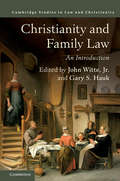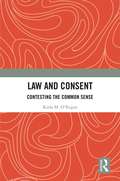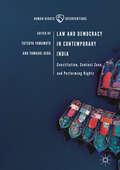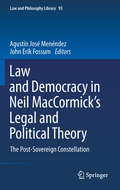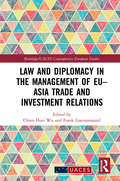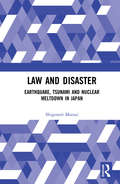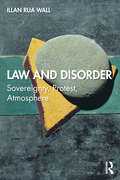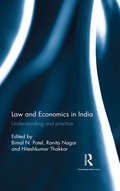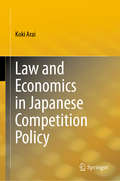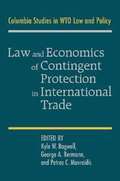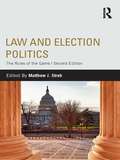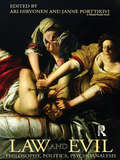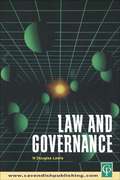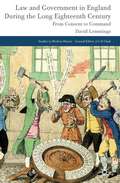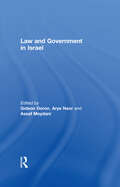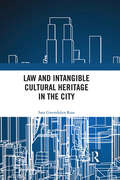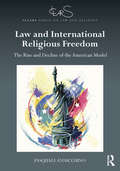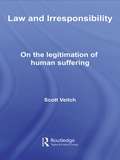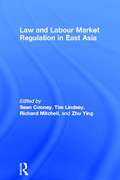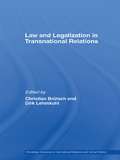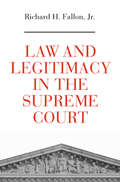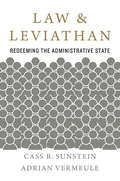- Table View
- List View
Law and Christianity: An Introduction (Law and Christianity)
by Gary S. Witte John Jr. HaukThe Western tradition has always cherished the family as an essential foundation of a just and orderly society, and thus accorded it special legal and religious protection. Christianity embraced this teaching from the start, and many of the basics of Western family law were shaped by the Christian theologies of nature, sacrament, and covenant. This volume introduces readers to the enduring and evolving Christian norms and teachings on betrothals and weddings; marriage and divorce; women's and children's rights; marital property and inheritance; and human sexuality and intimate relationships. The chapters are authoritatively written but accessible to college and graduate students and scholars, as well as clergy and laity. While alert to the hot button issues of sexual liberty today, the contributing authors let the historical figures speak for themselves about what Christianity has and can contribute to the protection and guidance of our most intimate association.
Law and Christianity: Christianity and Freedom
by Allen D. Hertzke Timothy Samuel Shah Shah Timothy Samuel Hertzke Allen D.In Volume 1 of Christianity and Freedom, leading historians uncover the unappreciated role of Christianity in the development of basic human rights and freedoms from antiquity through today. These include radical notions of dignity and equality, religious freedom, liberty of conscience, limited government, consent of the governed, economic liberty, autonomous civil society, and church-state separation, as well as more recent advances in democracy, human rights, and human development. Acknowledging that the record is mixed, scholars document how the seeds of freedom in Christianity antedate and ultimately undermine later Christian justifications and practices of persecution. Drawing from history, political science, and sociology, this volume will become a standard reference work for historians, political scientists, theologians, students, journalists, business leaders, opinion shapers, and policy makers.
Law and Christianity: The Distinctiveness of Religion in American Law
by Kathleen A. BradyIn recent decades, religion's traditional distinctiveness under the First Amendment has been challenged by courts and scholars. As America grows more secular and as religious and nonreligious convictions are increasingly seen as interchangeable, many have questioned whether special treatment is still fair. In its recent decisions, the Supreme Court has made clear that religion will continue to be treated differently, but we lack a persuasive account of religion's uniqueness that can justify this difference. This book aims to develop such an account. Drawing on founding era thought illumined by theology, philosophy of religion, and comparative religion, it describes what is at stake in our tradition of religious freedom in a way that can be appreciated by the religious and nonreligious alike. From this account, it develops a new framework for religion clause decision making and explains the implications of this framework for current controversies regarding protections for religious conscience.
Law and Consent: Contesting the Common Sense
by Karla M. O'ReganConsent is used in many different social and legal contexts with the pervasive understanding that it is, and has always been, about autonomy – but has it? Beginning with an overview of consent’s role in law today, this book investigates the doctrine’s inseparable association with personal autonomy and its effect in producing both idealised and demonised forms of personhood and agency. This prompts a search for alternative understandings of consent. Through an exploration of sexual offences in Antiquity, medical practice in the Middle Ages, and the regulation of bodily harm on the present-day sports field, this book demonstrates that, in contrast to its common sense story of autonomy, consent more often operates as an act of submission than as a form of personal freedom or agency. The book explores the implications of this counter-narrative for the law’s contemporary uses of consent, arguing that the kind of freedom consent is meant to enact might be foreclosed by the very frame in which we think about autonomy itself. This book will be of interest to scholars of many aspects of law, history, and feminism as well as students of criminal law, bioethics, and political theory.
Law and Democracy in Contemporary India: Constitution, Contact Zone, and Performing Rights (Human Rights Interventions)
by Tatsuya Yamamoto Tomoaki UedaThis book analyses legal orders, actors and democracy in contemporary India, with a particular focus on the everyday contexts and dynamics of human rights, citizenship and socio-economic rights and laws. The contributions explore both ‘institutionalization from above’, where the judiciary and legislative body aim to govern people, and ‘institutionalization from below’, where the governed attempt to expand their substantive rights embedded within their everyday lives. This analysis identifies contact zones between the two directions, which act as spaces for democratic participation and negotiation. Such a perspective should be useful to both those who are interested in Indian politics, and anthropologists and sociologists working on dynamics of laws and rights.
Law and Democracy in Neil MacCormick's Legal and Political Theory: The Post-Sovereign Constellation
by John Erik Fossum Agustín José MenéndezThis volume offers a collection of articles by leading legal and political theorists. Originally intended as a celebration of MacCormick's work on the occasion of the completion of the four-volume series on Law, State and Practical Reason, it has turned into a homage and salute after MacCormick's passing. Cast in MacCormick's reflexive spirit, the book presents a critical reconstruction of the Scottish philosopher's work, with the aim of revealing the connections between law and democracy in his writings and furthering his insights in each specific field. Neil MacCormick made outstanding contributions to the understanding of law and democracy under conditions of pluralism. His institutional theory of law has elucidated the close connection between the normative character of law as a means of social integration and legal social practices. This has produced a synthesis of the key insights of the legal and political theories of Kelsen, Hart, Alexy and Dworkin, and has broken new ground by undermining the 'monolithic' and 'nation-state' centered character of standard legal theories.
Law and Diplomacy in the Management of EU–Asia Trade and Investment Relations (Routledge/UACES Contemporary European Studies)
by Frank Gaenssmantel Chien-Huei WuThis volume fills a gap in the literature regarding questions around the interactive dynamics between law and diplomacy on international trade and investment. It brings together lawyers and political scientists from Europe and Asia in an interdisciplinary effort at tracing the respective roles of law and diplomacy in the relations of the European Union (EU) with its trade and investment partners in Asia. Focusing on trade and investment relations with Asia, the EU presents a particularly interesting case as it has been a strong proponent of a rules-based international economic order for years and a frequent user of the formal procedures established in international treaties in case of disputes. At the same time, it has kept diplomatically active to adjust dispute management and international agreements to the needs and demands of the partners involved. Furthermore, not only is this region of crucial importance due to the presence of both vigorous emerging economies, like China, India and Vietnam, and more established partners, like Japan, EU-Asia relations also present a broad set of economic disputes and recent negotiation efforts analyzed in the contributions to this volume. This book will be of key interest to scholars and students of international trade/economic law, EU politics, EU external relations (law), international relations, diplomacy and more broadly to international relations and Asian studies.
Law and Disaster: Earthquake, Tsunami and Nuclear Meltdown in Japan
by Shigenori MatsuiOn the 11th of March 2011, an earthquake registering 9.0 on the Richter scale (the most powerful to ever strike Japan) hit the Tohoku region in northern Japan. The earthquake produced a devastating tsunami that wiped out coastal cities and towns, leaving 18,561 people dead or registered as missing. Due to the disaster, the capability of the Fukushima Nuclear Power Plant, operated by Tokyo Electric Power Company (TEPCO), was compromised, causing nuclear meltdown. The hydrogen blast destroyed the facilities, resulting in a spread of radioactive materials, and, subsequently, serious nuclear contamination. This combined event – earthquake, tsunami, and nuclear meltdown – became known as the Great East Japan Earthquake Disaster. This book examines the response of the Japanese government to the disaster, and its attempts to answer the legal questions posed by the combination of earthquake, tsunami, and nuclear meltdown. Japanese law, policy, and infrastructure were insufficiently prepared for these disasters, and the country’s weaknesses were brutally exposed. This book analyses these failings, and discusses what Japan, and other countries, can learn from these events.
Law and Disorder: Sovereignty, Protest, Atmosphere
by Illan rua WallFocusing on the moment when social unrest takes hold of a populace, Law and Disorder offers a new account of sovereignty with an affective theory of public order and protest. In a state of unrest, the affective architecture of the sovereign order begins to crumble. The everyday peace and calm of public space is shattered as sovereign peace is challenged. In response, the state unleashes the full force of its exceptionality, and the violence of public order policing is deployed to restore the affects and atmospheres of habitual social relations. This book is a work of contemporary critical legal theory. It develops an affective theory of sovereign orders by focusing on the government of affective life and popular encounters with sovereignty. The chapters explore public order as a key articulation between sovereignty and government. In particular, policing of public order is exposed as a contemporary mode of exceptionality cast in the fires of colonial subjection. The state of unrest helps us see the ordinary affects of the sovereign order, but it also points to crowds as the essential component in the production of unrest. The atmospheres produced by crowds seep out from the squares and parks of occupation, settling on cities and states. In these new atmospheres, new possibilities of political and social organisation begin to appear. In short, crowds create the affective condition in which the settlement at the heart of the sovereign order can be revisited. This text thus develops a theory of sovereignty which places protest at its heart, and a theory of protest which starts from the affective valence of crowds. This book’s examination of the relationship between sovereignty and protest is of considerable interest to readers in law, politics and cultural studies, as well as to more general readers interested in contemporary forms of political resistance.
Law and Economics in India: Understanding and practice
by Bimal N. Patel Ranita Nagar Hiteshkumar ThakkarThis is one of the first volumes that uses economic tools to analyse and evaluate law and policy in India. Applying economic theories such as incentive analysis, cost–benefit studies, and game theory, the essays in the volume negotiate contentious issues in law including property, contracts, torts, nuclear liability regime, bankruptcy law, criminal law and procedure, constitutional law, administrative law, environmental law, and family law. A radical take on commercial and socio-legal issues in India, this book will greatly interest scholars and researchers of law, political economy, and public policy.
Law and Economics in Japanese Competition Policy
by Koki AraiThis book demonstrates how economics is used in cases of competition in Japan. Competition between firms is usually the most effective way of allocating economic resources and achieving consumer and producer welfare. At the same time, a balance must be struck; firms must not be over-regulated, but neither must they be completely free to create a monopoly or oligopoly. Therefore, the role of competition policy is to maintain a balance by using the collaborative economics of industrial organization. The book uses economic analysis to evaluate case studies on Japanese anti-monopoly law, the Act Concerning Prohibition of Private Monopolization and Maintenance of Fair Trade (AMA), and enforcement in e.g. cartel cases, private monopolization cases, and merger cases. The Japan Fair Trade Commission implements a competition policy, primarily through the enforcement of the AMA, which promotes ingenuity and innovation in business by guaranteeing and enhancing fair and free competition, thereby ensuring economic vitality and consumer benefit. This book is the first authoritative and compact work on competition policy in Japan, which has a more-than-70-year history and is based on solid legal principles. In addition, the book seeks to promote law enforcement based on economic analysis, and includes studies describing the enforcement mechanisms used. It provides comprehensive yet concise information on the structure of the AMA, recent cases, and economic analysis. It also explains the circumstances regarding recent cases and analyzes how the economic policy has been applied to actual cases.
Law and Economics of Contingent Protection in International Trade
by Kyle W. Bagwell George A. Bermann Petros C. MavroidisThe book discusses the regulatory framework of contingent protection in the World Trade Organization - antidumping, countervailing duties, and safeguards - as well as an economic analysis of these instruments. The book's various chapters illuminate the basic functioning of all three.
Law and Election Politics: The Rules of the Game
by Matthew J. StrebThough the courts have been extremely active in interpreting the rules of the electoral game, this role is misunderstood and understudied—as, in many cases, are the rules themselves. Law and Election Politics illustrates how election laws and electoral politics are intertwined, analyzing the rules of the game and some of the most important—and most controversial—decisions the courts have made on a variety of election-related subjects. More than a typical law book that summarizes cases, Mathew Streb has assembled an outstanding group of scholars to place electoral laws and the courts‘ rulings on those laws in the context of electoral politics. They comprehensively cover the range of topics important to election law—campaign finance, political parties, campaigning, redistricting, judicial elections, the Internet, voting machines, voter identification, ballot access, and direct democracy. This is an essential resource both for students of the electoral process and scholars of election law and election reform.
Law and Enforcement in Ptolemaic Egypt
by John BauschatzThis book examines the activities of a broad array of police officers in Ptolemaic Egypt (323-30 BC), and argues that Ptolemaic police officials enjoyed great autonomy, providing assistance to even the lowest levels of society when crimes were committed. Throughout the nearly 300 years of Ptolemaic rule, victims of crime in all areas of the Egyptian countryside called on local police officials to investigate crimes; hold trials; and arrest, question, and sometimes even imprison wrongdoers. Drawing on a large body of textual evidence for the cultural, social, and economic interactions between state and citizen, John Bauschatz demonstrates that the police system was efficient, effective, and largely independent of central government controls. No other law enforcement organization exhibiting such a degree of autonomy and flexibility appears in extant evidence from the rest of the Greco-Roman world.
Law and Evil: Philosophy, Politics, Psychoanalysis
by Ari Hirvonen Janne PorttikiviLaw and Evil opens, expands and deepens our understanding of the phenomenon of evil by addressing the theoretical relationship between this phenomenon and law. Hannah Arendt said 'the problem of evil will be the fundamental question of post-war intellectual life in Europe'. This statement is, unfortunately, more than valid in the contemporary world: not only in the events of war, crimes against humanity, terror, repression, criminality, violence, torture, human trafficking, and so on; but also as evil is used rhetorically to condemn these acts, to categorise their perpetrators, and to justify forcible measures, both in international and domestic politics and law. But what is evil? Evil as a concept is too often taken as something that is self-evident, something that is always already defined. Taking Kant’s concept of radical evil as a starting point, this volume counters such a tendency. Bringing together philosophical, political, and psychoanalytical perspectives, in analysing both the concept and the phenomenon of evil, the contributors to this volume offer a rich and thoroughgoing analysis of the multifaceted phenomenon of evil and its relationship to law.
Law and Governance
by N. Douglas LewisThis book describes the nature of these changes and identifies the accountability gaps which have inevitably opened up in the absence of a written constitution or a considered Administrative Procedure Act.
Law and Government in England during the Long Eighteenth Century
by David LemmingsOver the long eighteenth century English governance was transformed by large adjustments to the legal instruments and processes of power. This book documents and analyzes these shifts and focuses upon the changing relations between legal authority and the English people.
Law and Government in Israel
by Assaf Meydani Gideon Doron Arye NaorWhile most current studies on law and politics in Israel focus on the legal aspects of public policymaking within the courts, this book explores the relationship between law and government from a positive perspective. That is to say that the question asked is: how the political relationships between the three branches of government affect public policy and hence social outcomes. The eleven contributors to this volume concentrate on Israel from theoretical, comparative and critical approaches, and hence the analysis presented could as well be applied to other polities. This book was published as a special issue of Israel Affairs.
Law and Intangible Cultural Heritage in the City
by Sara Gwendolyn RossWith disappearing music venues, and arts and culture communities at constant risk of displacement in our urban centers, the preservation of intangible cultural heritage is of growing concern to global cities. This book addresses the role and protection of intangible cultural heritage in the urban context. Using the methodology of Urban Legal Anthropology, the author provides an ethnographic account of the civic effort of Toronto to become a Music City from 2014-18 in the context of redevelopment and gentrification pressures. Through this, the book elucidates the problems cities like Toronto have in equitably protecting intangible cultural heritage and what can be done to address this. It also evaluates the engagement that Toronto and other cities have had with international legal frameworks intended to protect intangible cultural heritage, as well as potential counterhegemonic uses of hegemonic legal tools. Understanding urban intangible cultural heritage and the communities of people who produce it is of importance to a range of actors, from urban developers looking to formulate livable and sustainable neighbourhoods, to city leaders looking for ways in which their city can flourish, to scholars and individuals concerned with equitability and the right to the city. This book is the beginning of a conservation about what is important for us to protect in the city for future generations beyond built structures, and the role of intangible cultural heritage in the creation of full and happy lives. The book is of interest to legal and sociolegal readers, specifically those who study cities, cultural heritage law, and legal anthropology.
Law and International Religious Freedom: The Rise and Decline of the American Model (ICLARS Series on Law and Religion)
by Pasquale AnnicchinoThis book analyzes the promotion and protection of freedom of religion in the international arena with a particular focus on the role and influence of the US International Religious Freedom Act, 1998. It also investigates the impact of the IRFA on the legislation and policies of third countries and the EU. The book develops the story of the protection of religious freedom through foreign policy by showing how religious laws affect and shape a more communitarian dimension of the notion of freedom of religion which stands in contrast with a traditionally Western individualistic understanding of the right. It is argued that it is still possible to defend the unstable category of freedom of religion or belief especially when major violations are at stake. The book presents a balanced contribution to the academic debate on the promotion and protection of religious freedom. The comparative approach and interdisciplinary methodology make it a valuable resource for academics, students and policy-makers in Law, International Relations and Strategic Studies.
Law and Irresponsibility: On the Legitimation of Human Suffering
by Scott VeitchLaw is widely assumed to provide contemporary society with its most important means of organizing responsibility. Across a broad range of areas of social life – from the activities of states and citizens, to work, business and private relationships – it is understood that legal regulation plays a crucial role in defining and limiting responsibilities. But Law and Irresponsibility pursues the opposite view: it explores how law organizes irresponsibility. With a particular focus on large-scale harms – including extensive human rights violations, forms of colonialism, and environmental or nuclear devastation – this book analyzes the ways in which law legitimates human suffering by demonstrating how legal institutions operate as much to deflect responsibility for harms suffered as to acknowledge them. Drawing on a series of case studies, it shows not only how law facilitates the dispersal and disavowal of responsibility, but how it does so in consistent and patterned ways. Irresponsibility is organized, and its organization is traced here to the legal forms, and the social and political conditions, that sustain ‘our’ complicity in human suffering. This innovative and interdisciplinary book provides a radical challenge to conventional thinking about law and legal institutions. It will be of considerable interest to those working in law, political and legal theory, sociology and moral philosophy.
Law and Labour Market Regulation in East Asia (Routledge Studies in the Growth Economies of Asia)
by Richard Mitchell Tim Lindsey Sean Cooney Zhu YingThis edited collection examines the labour laws of seven industrializing East Asian societies - China, Indonesia, Malaysia, South Korea, Taiwan, the Philippines and Vietnam - and discusses the variation in their impact across the whole region. Leading scholars from each country consider both laws pertaining to working conditions and industrial relations, and those that regulate the labour market as a whole. Legislation concerning migrant labour, gender equality, employment creation and skills formation is also examined. Adopting their own distinct theoretical perspectives, the authors trace the historical development of labour regulation and reveal that most countries in the region now have quite extensive frameworks. This book will be particularly useful to people interested in the place of labour law, and law in general, in contemporary East Asian societies.
Law and Legalization in Transnational Relations (Routledge Advances in International Relations and Global Politics #Vol. 54)
by Christian Brütsch Dirk LehmkuhlThis volume addresses the emergence of multiple legal and law-like arrangements that alter the interaction between states, their delegated agencies, international organizations and non-state actors in international and transnational politics. Political scientists and legal scholars have been addressing the ‘legalization’ of international regimes and international politics, and engaging in interdisciplinary research on the nature, the causes and the effects of the norm driven controls over different areas and dimensions of global governance. Written by leading contributors in the field, the book claims that the emergence and spread of legal and law-like arrangements contributes to the transformation of world politics, arguing that ‘legalization’ does not only mean that states co-operate in more or less precise, binding and independent regimes, but also that different types of non-state actors can engage in the framing, definition, implementation and enforcement of legal and law-like norms and rules. To capture these diverse observations, the volume provides an interpretative framework that includes the increase in international law-making, the variation of legal and legalized regimes and the differentiation of legal and law-like arrangements. Law and Legalization in Transnational Relations is of interest to students and researchers of international politics, international relations and law.
Law and Legitimacy in the Supreme Court
by Richard H. Fallon Jr.Richard Fallon offers theories of constitutional law and judicial legitimacy that accept many tenets of legal realism but reject its corrosive cynicism. Based on an ideal of good faith, his account both illuminates current practice and prescribes urgently needed responses to a legitimacy crisis in which the Supreme Court is increasingly enmeshed.
Law and Leviathan: Redeeming The Administrative State
by Cass R. Sunstein Adrian VermeuleFrom two legal luminaries, a highly original framework for restoring confidence in a government bureaucracy increasingly derided as “the deep state.”Is the modern administrative state illegitimate? Unconstitutional? Unaccountable? Dangerous? Intolerable? American public law has long been riven by a persistent, serious conflict, a kind of low-grade cold war, over these questions.Cass Sunstein and Adrian Vermeule argue that the administrative state can be redeemed, as long as public officials are constrained by what they call the morality of administrative law. Law and Leviathan elaborates a number of principles that underlie this moral regime. Officials who respect that morality never fail to make rules in the first place. They ensure transparency, so that people are made aware of the rules with which they must comply. They never abuse retroactivity, so that people can rely on current rules, which are not under constant threat of change. They make rules that are understandable and avoid issuing rules that contradict each other.These principles may seem simple, but they have a great deal of power. Already, without explicit enunciation, they limit the activities of administrative agencies every day. But we can aspire for better. In more robust form, these principles could address many of the concerns that have critics of the administrative state mourning what they see as the demise of the rule of law. The bureaucratic Leviathan may be an inescapable reality of complex modern democracies, but Sunstein and Vermeule show how we can at last make peace between those who accept its necessity and those who yearn for its downfall.
